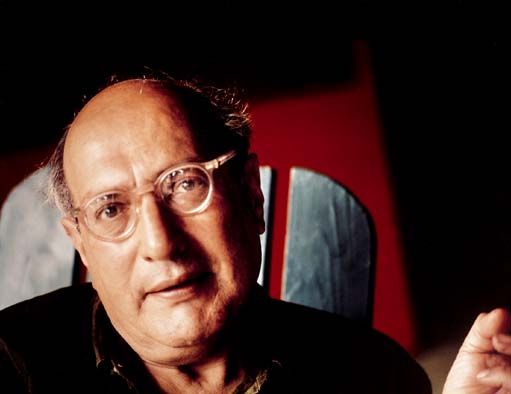I met Mark Rothko in a dream last night. The details are fuzzy, but I recall that I spotted him in NYC somewhere, and had a chance to take a really great picture of him (something akin to the image above), but missed it. The next time I got a chance, he was coming down some stairs, so I just went for it, and my flash went off, which made him very upset. I quickly apologized, and told him that I’m a great admirer of his work—“In fact,” I told him, “I’m in the middle of your biography.”
“Oh,” he replied, with an I’m-rolling-my-eyes tone in his voice—not because he wasn’t impressed: “Have you gotten to the terribly depressing ending yet, where I kill myself in self-pity?”
I am, in fact, in the middle of his biography. Rothko was notoriously predisposed to being contrary. If anyone said something admiring about his work—despite being accurate—he would claim they’re missing the point entirely. He simultaneously desired fame and notoriety, and cursed the impersonal commercialization of his work that fame brought on. So, this dreamed-up response of Rothko’s, where he’s embarrassed by his own life, is quite fitting.
At this point, I start to get a little confused. After being invited by him to his apartment (dirty, messy), I have to ask, “What year is it?”
“1974.”
Rothko killed himself in 1970. It was as if he’d read his own biography, and was determined to rebel against his own status-quo. In the dream, he was sick and dying, but had managed to stick it to his own history.
There was another person there with us, a guy my age, who was constantly interrupting my questions—question, really. I had one question I wanted to ask him, that would have gone something like this:
“In our modern day, bright, saturated colors like those in your paintings are so commonplace—we have unnaturally vivid TVs, computer screens, phones—even print technology is much more vivid and accurate than it was in the 50s. Would you say that your paintings, in the cultural context of black and white tvs, muted color magazines, and centuries upon centuries of a more ‘natural’ use of color, were that much more violent, stunning, and other-worldly?”
But I never got the chance. I’m sure he would have answered it by tearing my question apart—which I think would have enjoyed.
